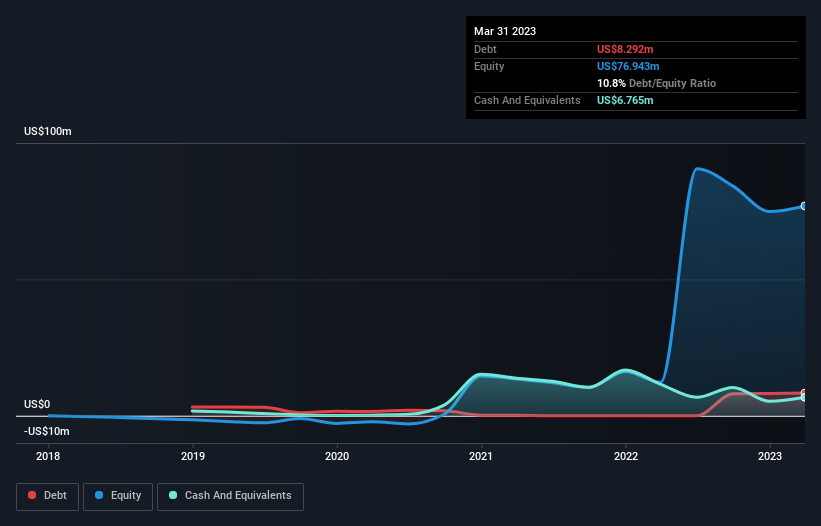- United States
- /
- Tech Hardware
- /
- NasdaqCM:QUBT
Would Quantum Computing (NASDAQ:QUBT) Be Better Off With Less Debt?
Warren Buffett famously said, 'Volatility is far from synonymous with risk.' So it seems the smart money knows that debt - which is usually involved in bankruptcies - is a very important factor, when you assess how risky a company is. Importantly, Quantum Computing, Inc. (NASDAQ:QUBT) does carry debt. But is this debt a concern to shareholders?
Why Does Debt Bring Risk?
Generally speaking, debt only becomes a real problem when a company can't easily pay it off, either by raising capital or with its own cash flow. In the worst case scenario, a company can go bankrupt if it cannot pay its creditors. While that is not too common, we often do see indebted companies permanently diluting shareholders because lenders force them to raise capital at a distressed price. Of course, the upside of debt is that it often represents cheap capital, especially when it replaces dilution in a company with the ability to reinvest at high rates of return. When we think about a company's use of debt, we first look at cash and debt together.
See our latest analysis for Quantum Computing
What Is Quantum Computing's Net Debt?
The image below, which you can click on for greater detail, shows that at March 2023 Quantum Computing had debt of US$8.29m, up from none in one year. On the flip side, it has US$6.76m in cash leading to net debt of about US$1.53m.

A Look At Quantum Computing's Liabilities
The latest balance sheet data shows that Quantum Computing had liabilities of US$12.6m due within a year, and liabilities of US$11.9k falling due after that. Offsetting these obligations, it had cash of US$6.76m as well as receivables valued at US$63.0k due within 12 months. So its liabilities total US$5.76m more than the combination of its cash and short-term receivables.
Of course, Quantum Computing has a market capitalization of US$71.4m, so these liabilities are probably manageable. Having said that, it's clear that we should continue to monitor its balance sheet, lest it change for the worse. The balance sheet is clearly the area to focus on when you are analysing debt. But it is future earnings, more than anything, that will determine Quantum Computing's ability to maintain a healthy balance sheet going forward. So if you're focused on the future you can check out this free report showing analyst profit forecasts.
Given it has no significant operating revenue at the moment, shareholders will be hoping Quantum Computing can make progress and gain better traction for the business, before it runs low on cash.
Caveat Emptor
Over the last twelve months Quantum Computing produced an earnings before interest and tax (EBIT) loss. Its EBIT loss was a whopping US$38m. Considering that alongside the liabilities mentioned above does not give us much confidence that company should be using so much debt. Quite frankly we think the balance sheet is far from match-fit, although it could be improved with time. However, it doesn't help that it burned through US$19m of cash over the last year. So suffice it to say we consider the stock very risky. When analysing debt levels, the balance sheet is the obvious place to start. But ultimately, every company can contain risks that exist outside of the balance sheet. For example, we've discovered 6 warning signs for Quantum Computing (3 don't sit too well with us!) that you should be aware of before investing here.
If, after all that, you're more interested in a fast growing company with a rock-solid balance sheet, then check out our list of net cash growth stocks without delay.
Valuation is complex, but we're here to simplify it.
Discover if Quantum Computing might be undervalued or overvalued with our detailed analysis, featuring fair value estimates, potential risks, dividends, insider trades, and its financial condition.
Access Free AnalysisHave feedback on this article? Concerned about the content? Get in touch with us directly. Alternatively, email editorial-team (at) simplywallst.com.
This article by Simply Wall St is general in nature. We provide commentary based on historical data and analyst forecasts only using an unbiased methodology and our articles are not intended to be financial advice. It does not constitute a recommendation to buy or sell any stock, and does not take account of your objectives, or your financial situation. We aim to bring you long-term focused analysis driven by fundamental data. Note that our analysis may not factor in the latest price-sensitive company announcements or qualitative material. Simply Wall St has no position in any stocks mentioned.
About NasdaqCM:QUBT
Quantum Computing
An integrated photonics company, provides quantum machines to commercial and government markets in the United States.
Flawless balance sheet with slight risk.
Similar Companies
Market Insights
Weekly Picks


The "Sleeping Giant" Stumbles, Then Wakes Up

Swiped Left by Wall Street: The BMBL Rebound Trade


Duolingo (DUOL): Why A 20% Drop Might Be The Entry Point We've Been Waiting For
Recently Updated Narratives


The "Molecular Pencil": Why Beam's Technology is Built to Win

Intuit Stock: When Financial Software Becomes the Operating System for Small Business

Meta’s Bold Bet on AI Pays Off
Popular Narratives


The "Sleeping Giant" Stumbles, Then Wakes Up


A case for CA$31.80 (undiluted), aka 8,616% upside from CA$0.37 (an 86 bagger!).





